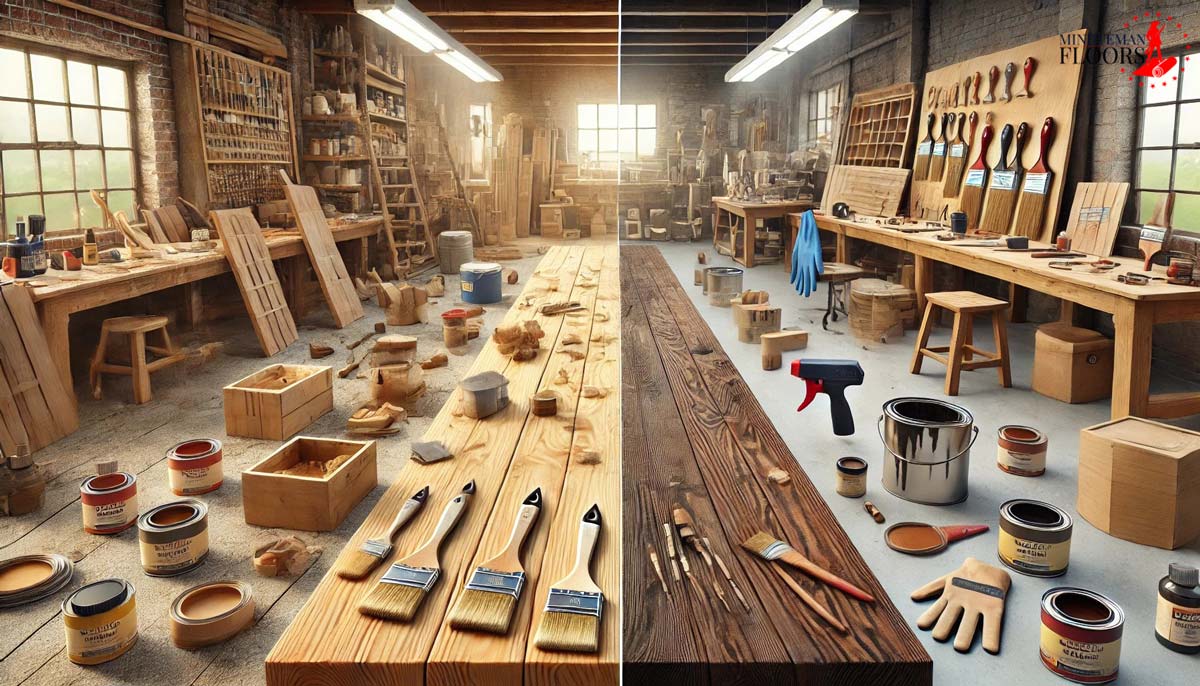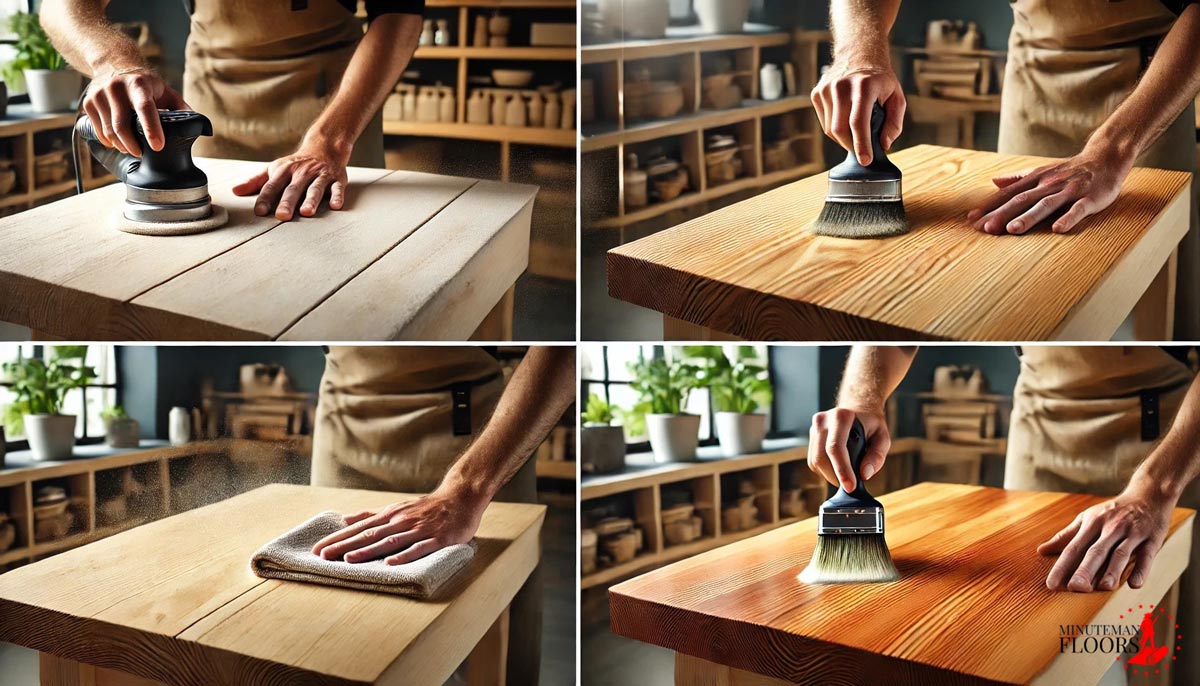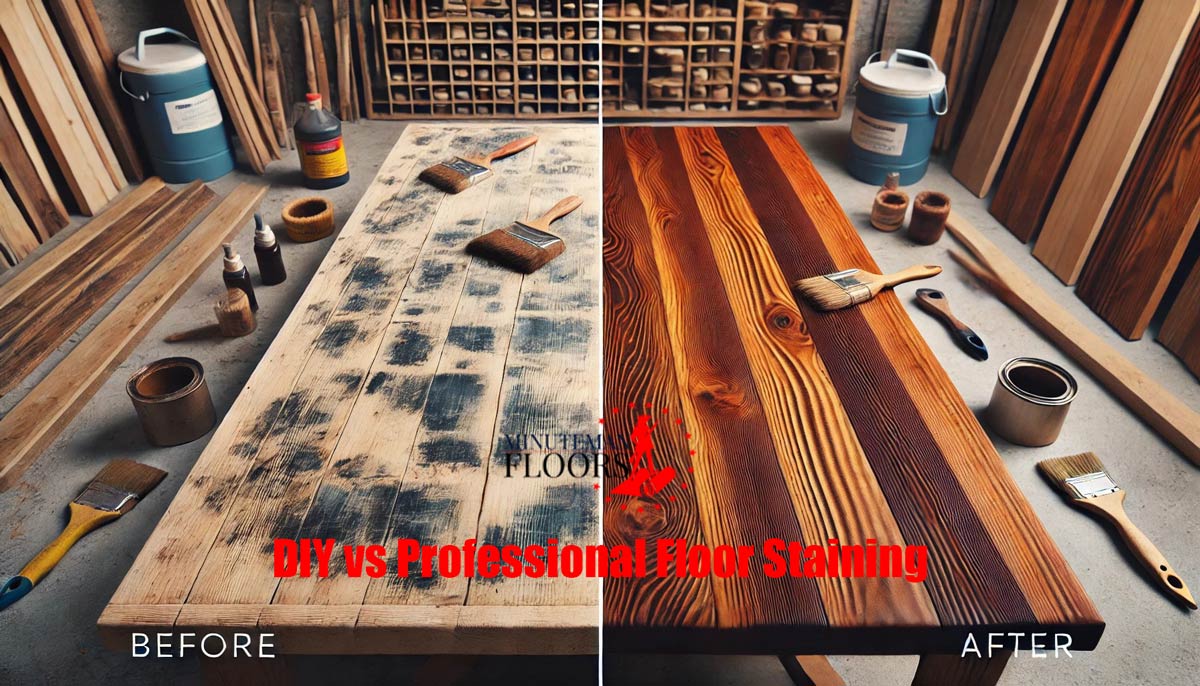When it comes to enhancing the beauty of hardwood flooring, stained wood stands out for its luxurious appeal, customizable options, and ability to mask imperfections. A fresh stain can rejuvenate even the most worn-out floors, breathing new life into your space. However, many homeowners grapple with an important decision: should they hire a professional or take on the task themselves?
Both options have their merits and challenges, and choosing the right one depends on factors such as your budget, expertise, and desired results. This comprehensive guide explores the pros and cons of professional vs DIY floor staining, empowering you to make the best choice for your hardwood flooring needs.
Additionally, we’ll delve into essential factors to consider before staining your hardwood floor, such as wood type, environmental conditions, and the importance of proper preparation. By the end of this blog, you’ll have a clear understanding of the best approach to achieving stunning, long-lasting floors.
Looking for expert hardwood floor staining in Manchester, NH? Contact Minuteman Floors at (603) 782-1942 for high-quality, stress-free solutions!
Factors to Consider Before Staining Hardwood Floors: Avoid Costly Mistakes
Deciding between natural wood and stained hardwood floors is a crucial first step in your flooring journey. If you’ve chosen the elegance of stained wood, there are several key factors to consider before taking on the staining process. Staining a hardwood floor isn’t a one-size-fits-all task—it requires careful planning and understanding of your specific floor type, condition, and environment to ensure a flawless finish.
In many cases, a properly stained hardwood floor not only looks better but also safeguards the wood against daily wear and tear, extending its lifespan. (Read more about choosing between natural vs stained hardwood flooring here.)
Why Plan Ahead?
A properly executed staining
process not only enhances the look of your floor but also protects it from wear and
tear, extending its lifespan. Without proper preparation, however, you risk uneven
coloring, blotchy finishes, or even damage to the wood. Here's what to consider before
diving into your floor staining project.
1. Understanding Your Wood Type
Not all wood species react the same way to stains. The density, grain pattern, and porosity of the wood significantly affect how it absorbs stain.
- Easily Stainable Woods: Oak is a popular choice for its ability to absorb stains evenly, creating a smooth and rich appearance.
- Challenging Woods: Maple and birch are less porous, making it harder for the stain to penetrate evenly, which may lead to blotches or streaks.
- Natural Color Impact: The wood’s inherent hue can alter the final stain color. For instance, lighter woods often require multiple coats to achieve a darker shade, while naturally darker woods may need only one coat.
Pro Tip: Always test your chosen stain on a small, inconspicuous area to ensure the final color meets your expectations.
2. Condition of the Hardwood Floor
The current state of your floor plays a vital role in the success of your staining project.
- Repair and Preparation: Floors with scratches, dents, or uneven surfaces must be repaired and sanded thoroughly to ensure the stain adheres evenly.
- Existing Finishes: If your floor already has a finish or stain, it will need to be stripped completely. Without this step, new stains may not penetrate the wood properly, resulting in a patchy appearance.
Pro Tip: Sanding is a non-negotiable step for achieving professional-quality results. Ensure the floor is smooth and free of debris before applying the stain.
3. Choosing the Right Stain and Finish
The stain determines the color of your floor, but the finish defines its shine and durability.
- Transparent Stains: Highlight the natural grain of the wood, offering a classic and timeless look.
- Pigmented Stains: Provide a uniform appearance by masking imperfections, ideal for modern and sleek designs.
- Finish Options: From matte to high-gloss, the finish you choose should complement your interior style and lighting conditions.
Pro Tip: Consider the foot traffic in the area when choosing a finish. High-traffic areas benefit from more durable, scratch-resistant finishes.
4. Environmental Factors
Environmental conditions, such as humidity and temperature, can significantly impact the staining process and results.
- Humidity: High humidity prolongs drying times and may cause uneven staining.
- Temperature: Low temperatures can prevent the stain from adhering properly, leading to a subpar finish.
Pro Tip: Always follow the manufacturer’s guidelines for ideal staining conditions, and work in a well-ventilated space to ensure even drying.
5. Cost and Time Considerations
While planning your project, factor in the time and cost of materials, preparation, and execution. DIY staining might save money upfront but can become expensive if mistakes require additional work or professional intervention.
By considering these factors, you can avoid common pitfalls and ensure a successful staining project. Whether you’re staining your hardwood floors yourself or hiring a professional, preparation is key to achieving a long-lasting and visually stunning result.
For more tips on hardwood floor maintenance and staining techniques, visit The National Wood Flooring Association (NWFA).
Professional vs. DIY Floor Staining: Pros and Cons

Once you’ve decided to stain your hardwood floors, the next big question is whether to hire a professional or tackle the project yourself. Both approaches have their unique benefits and challenges, and understanding the pros and cons can help you make the best decision for your home, budget, and desired results.
Benefits of Professional Hardwood Floor Staining
Hiring a professional offers several advantages, especially if you value a flawless finish and a hassle-free experience.
- Guaranteed Results
Professionals have the skills and experience to deliver smooth, even, and long-lasting results that match your expectations. You can rest easy knowing the job will be done right the first time. - Access to Premium Tools and
Products
Professional floor staining services use commercial-grade equipment and high-quality stains and finishes that are often unavailable to DIYers. These tools ensure a superior outcome and enhanced durability. - Time Efficiency
A professional team can complete the job in a fraction of the time it would take a DIYer, especially if the project involves sanding, repairing, or treating a large area. - Expert Advice
Professionals can provide tailored recommendations for stain colors, finishes, and maintenance based on your specific wood type, interior design, and lifestyle. - Durable and Long-Lasting Results
With proper techniques and high-quality materials, professional staining can extend the lifespan of your hardwood floors, reducing the need for frequent refinishing.
Pro Tip: Always check reviews, certifications, and portfolios before hiring a professional to ensure you’re working with a trusted expert.
Drawbacks of Professional Floor Staining
While hiring a professional offers convenience and expertise, it comes with some potential downsides:
- Higher Costs
Labor fees and the use of premium products can make professional staining significantly more expensive than a DIY approach. - Scheduling Challenges
You may need to coordinate your project around the contractor’s availability, which can delay your plans. - Temporary Disruption
Having workers, equipment, and supplies in your home can disrupt your daily routine, especially for larger projects.
Advantages of DIY Hardwood Floor Staining
For those willing to roll up their sleeves, DIY hardwood floor staining can be a rewarding experience.
- Cost Savings
DIY staining is typically more budget-friendly, as you won’t need to pay for labor costs. You can invest in just the materials and equipment required for the project. - Complete Control
From choosing the stain color to deciding the timing of the project, you have full control over every aspect. This flexibility is ideal for homeowners who want to personalize their floors on their own terms. - Skill Development
Taking on the task yourself is an opportunity to learn a new skill. The hands-on experience can be satisfying and useful for future home improvement projects.
Disadvantages of DIY Floor Staining
While DIY projects can save money and offer flexibility, they also come with notable challenges:
- Time-Consuming
Staining a hardwood floor is a labor-intensive process that requires proper preparation, including sanding and cleaning. Mistakes can add even more time to the project. - Risk of Unsatisfactory Results
Lack of experience can lead to uneven staining, blotches, or poor stain adherence, leaving the floor looking worse than before. Achieving professional-quality results requires knowledge of wood types, application techniques, and preparation. - Equipment Rental Costs
If your floor needs sanding or buffing before staining, you’ll need to rent specialized equipment, which can add to your expenses and complexity. - No Professional Warranty
Unlike professional services, DIY projects don’t come with a guarantee. If something goes wrong, you’ll need to fix it on your own or hire a professional to correct the mistakes.
Making the Right Choice: Professional or DIY?
Ultimately, the decision between professional and DIY hardwood floor staining depends on your priorities:
- Choose professional services if you value convenience, expertise, and guaranteed results, and are willing to invest in higher upfront costs.
- Opt for DIY staining if you’re working with a limited budget, have the time and patience to learn, and are confident in your ability to achieve satisfactory results.
Wondering how much hardwood floor staining costs in Manchester, NH? Contact Minuteman Floors at (603) 782-1942 for a free consultation and expert advice on your next project!
Frequently Asked Questions: Professional vs. DIY Hardwood Floor Staining
If you’re still unsure whether to hire a professional or tackle the project yourself, these frequently asked questions can provide more clarity. From understanding costs to choosing the right tools, here’s everything you need to know about professional and DIY hardwood floor staining.
1. Do I Need Expensive Tools for DIY Hardwood Floor Staining?
Staining itself doesn’t require expensive tools—basic items like applicators, brushes, and cleaning supplies are usually enough for applying the stain. However, if your floor needs preparation such as sanding or buffing, you’ll need to rent specialized equipment like floor sanders and buffing machines.
Pro Tip: Renting tools can add to the cost of a DIY project. Ensure you budget for these expenses and learn how to use the equipment safely to avoid costly mistakes.
2. Can I Achieve Professional-Quality Results with DIY Floor Staining?
It’s possible, but achieving a professional-quality finish requires:
- A thorough understanding of your wood type and its reaction to stains.
- Proper preparation, including sanding and cleaning.
- Using high-quality stains and finishes.
- Experience with application techniques to avoid streaks and blotches.
Without these elements, the results may not meet your expectations.
Pro Tip: If you’re new to staining, start with a small, less noticeable area to practice before tackling larger spaces.
3. What Types of Projects Are Best for DIY Hardwood Floor Staining?
DIY staining is ideal for:
- Small spaces like closets or single rooms, where errors are less noticeable.
- Temporary solutions, such as improving the appearance of a rental property.
- Projects where budget constraints are a primary concern.
For larger, high-visibility areas or projects involving complex preparation, hiring a professional is often the better choice.
4. How Long Does the Hardwood Floor Staining Process Take?
The timeline varies depending on the floor’s condition and whether you’re doing the work yourself or hiring a professional.
- DIY Projects: Typically take longer due to preparation, sanding, and learning curves. Expect at least a weekend for smaller spaces and more for larger areas.
- Professional Services: Often complete the job in 1–3 days, depending on the size and scope of the project.
Pro Tip: Always factor in drying times for the stain and finish, as these can add several days before the floor is ready for use.
5. What Are the Risks of Skipping Proper Preparation for Staining?
Skipping essential preparation steps, such as sanding and cleaning, can lead to:
- Uneven stain absorption, resulting in blotches or streaks.
- Poor stain adherence, causing peeling or fading over time.
- A less durable finish that requires frequent reapplications.
Pro Tip: Proper preparation is crucial whether you’re doing it yourself or hiring a professional. Neglecting this step can compromise the floor’s appearance and lifespan.
6. Is Professional Floor Staining Worth the Cost?
For many homeowners, professional floor staining is worth the investment due to the convenience, expertise, and superior results it provides. While the upfront cost is higher, the long-lasting finish and reduced risk of errors often save money in the long run.
Pro Tip: To ensure value for your money, get quotes from multiple contractors, review their previous work, and ask for references before making a decision.
7. How Can I Control Costs If I Hire a Professional?
To minimize costs while hiring a professional:
- Opt for a simpler finish instead of complex custom stains.
- Prepare the area beforehand, such as moving furniture or cleaning the floors.
- Schedule the project during off-peak seasons when contractors may offer discounts.
Pro Tip: Request an itemized estimate to understand where your money is going and identify areas where you can save.
8. Can Environmental Factors Affect the Staining Process?
Yes, environmental conditions like humidity and temperature play a critical role in the staining process.
- High Humidity: Prolongs drying times and may result in uneven finishes.
- Low Temperatures: Can prevent the stain from adhering properly, leading to unsatisfactory results.
Pro Tip: Always work in a climate-controlled environment or schedule your project during optimal weather conditions.
9. What Is the Average Cost Difference Between DIY and Professional Floor Staining?
The cost difference between DIY and professional floor staining can vary significantly based on the size of the project, the condition of the floor, and the materials used:
- DIY Staining: Costs typically include stain, applicators, cleaning supplies, and any equipment rentals (like sanders or buffers). For a mid-sized room, expect to spend $200–$500.
- Professional Staining: Professional services include labor, materials, and the use of advanced equipment. Costs typically range from $3–$5 per square foot, with larger or more complex projects costing more.
Pro Tip: For high-traffic areas or intricate designs, professional services often provide better long-term value due to their durability and expertise.
10. How Do I Know When My Hardwood Floors Need Refinishing or Staining?
Several signs indicate your hardwood floors may need refinishing or staining:
- Visible Scratches or Dents: Heavy wear and tear, especially in high-traffic areas, can cause visible damage.
- Dull or Faded Appearance: Over time, floors lose their shine due to dirt, sunlight, and daily use.
- Water Damage: Stains, warping, or discoloration caused by spills or leaks may require refinishing.
- Peeling or Chipping Finish: When the protective finish wears off, the wood becomes vulnerable to damage.
Pro Tip: Regular maintenance, such as cleaning and resealing, can extend the time between refinishing projects.
Restore Your Hardwood Floors with Minuteman Floors: Expert Refinishing and Staining Services
Your hardwood floors are more than just a surface—they’re an integral part of your home’s character and aesthetic appeal. Whether you’re looking to rejuvenate worn-out floors, enhance their natural beauty, or create a whole new look with a custom stain, Minuteman Floors is here to help.
With years of experience in hardwood floor installation, repair, and refinishing, we have perfected a multi-step process that guarantees stunning, durable results every time. Our professional team is committed to providing top-quality craftsmanship and personalized service to bring your vision to life.
Why Choose Minuteman Floors for Hardwood Refinishing and Staining?

- Expertise You Can Trust
Our skilled technicians understand the unique characteristics of various wood species and know how to prepare, stain, and finish your floors to perfection. - Premium Tools and Materials
We use state-of-the-art equipment and high-quality stains and finishes to ensure a smooth, even application and a long-lasting result. - Customized Solutions
Every home is different, and we take the time to understand your design preferences, lifestyle needs, and budget to deliver tailored solutions. - Comprehensive Services
From minor repairs to complete refinishing, we handle every step of the process, including sanding, buffing, staining, and finishing. - Hassle-Free Experience
We prioritize clear communication, timely completion, and minimal disruption to your daily life, making the entire process stress-free.
Our Unique Hardwood Refinishing Process
At Minuteman Floors, we believe in going the extra mile to ensure exceptional results. Here’s how we achieve a flawless finish every time:
- Initial Assessment
We evaluate the condition of your hardwood floors to determine the best approach, whether it’s minor repairs, deep sanding, or complete refinishing. - Sanding and Preparation
Using advanced sanding equipment, we remove old stains, finishes, and imperfections, creating a smooth surface that’s ready for staining. - Custom Staining
We work with you to select the perfect stain color, testing it on your specific wood type to ensure it complements your home’s design and lighting. - Finishing Touches
We apply a durable topcoat in your preferred sheen—matte, satin, semi-gloss, or high-gloss—to protect the stain and enhance the floor’s appearance. - Final Inspection
Before we consider the job complete, we conduct a thorough quality check to ensure every detail meets our high standards.
Transform Your Hardwood Floors Today
Don’t let scratched, dull, or outdated floors detract from your home’s beauty. Whether you’re in need of a quick refresh or a complete transformation, Minuteman Floors is your trusted partner for hardwood floor refinishing and staining in Manchester, NH, and the surrounding areas.
Call us today at (603) 782-1942 to schedule your free in-home consultation! Let us help you bring out the best in your hardwood floors with expert services that combine quality, precision, and care.

